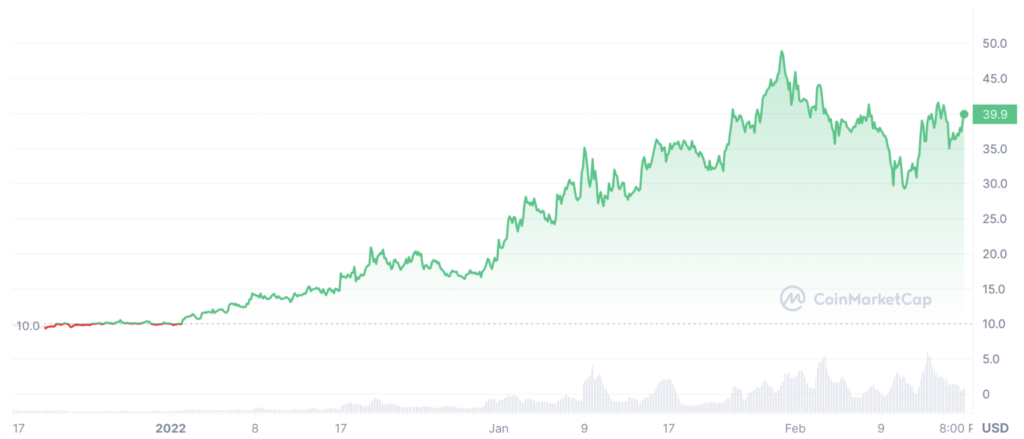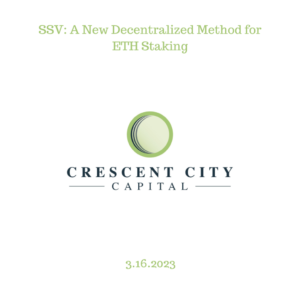SSV: A New Decentralized Method for ETH Staking
By Tyshe Jiang | Crescent City Capital Market Analyst Intern

What is SSV
SSV.network is a project that aims to provide a decentralized oracle network for off-chain data on the Ethereum blockchain. The project’s name “SSV” stands for “Secure Scuttlebutt Vessel,” which is a reference to a decentralized social network protocol called Secure Scuttlebutt (SSB). SSV was originated as a research piece by the Ethereum Foundation back in 2019 and developed in 2022.
When Vitalik revealed that Ethereum will be switching from a PoW to a PoS architecture, the team wanted to offer new opportunities to experiment with staking in the crypto world. The ssv.network team pursued incorporating more people in the network, as anybody can become a validator and receive ETH incentives. The goal of the project is to go a step beyond Staking-as-a-Service by creating something more safe, inclusive, and favorable to long-term decentralization. Therefore, SSV is an open source protocol that anybody may use to gain access to decentralized staking on the Ethereum blockchain. The protocol works by establishing a decentralized staking infrastructure that allows an Ethereum validator to be distributed.
SSV Tech
The SSV Network is a purpose-built staking infrastructure that enables the distributed functioning of Ethereum validators. To do this, the network divides each validator key called KeyShares across four non-trusting nodes. Non-trusting nodes, as the name implies, do not need to trust other nodes to function. Since there is no single point of failure, a malfunctioning node cannot degrade network performance. Each node performs validation chores collectively using a consensus technique and is managed by a consensus layer.
Through this process, operators can configure their node to run their KeyShares in whatever way they see appropriate using ssv.network. They can use various validator clients on entirely different infrastructures and be located anywhere in the world. This enables SSV stakeholders to spread their validators and risk. SSV will continue validating even if one of the nodes executing a validator is defective, has poor performance, or commits a slashable violation. This is fantastic for validator liveness and security.

The SSV network is powered by three key participants: operators, stakeholders, and decentralized autonomous organization (DAO) members. Operators are in charge of supervising validators and carrying out various tasks on Ethereum’s PoS execution layer, known as the Beacon Chain. Annual operator costs are fixed in SSV tokens by the operators. Stakers get incentives by depositing their ETH with operators, who subsequently aid with the security of the Ethereum network. Stakers must select at least four preferred operators, allocate validator KeyShares to them, and pay a yearly fee to them. Apart from operator costs, stakeholders are subject to network fees set by the DAO. Meanwhile, DAO members assist in network governance and the decentralization of protocol and treasury ownership. Everyone with an SSV token can participate in the DAO and vote on critical SSV Network decisions.
SSV Token
The SSV token (SSV) is a native token for the SSV Network protocol to function. The SSV token is linked to the network’s protocol and is vital to the system’s adoption and success. The token may be used to pay network and operator costs as well as for governance. In terms of governance, the community uses SSV to vote on and influence the protocol, the treasury, and the ecosystem as a whole. Meanwhile, operators can set their own rates and receive an annual payment from SSV stakeholders. The DAO treasury receives a portion of the fees collected by the operators. When more ETH is invested in the SSV Network, the operators and DAO treasury will get more fees, resulting in good growth for the protocol.
Recent Updates
The live ssv.network price on March 16th is $39.82 USD with a 24-hour trading volume of $49,060,609 USD. It has a circulating supply of 10,000,000 SSV coins.

Summary
SSV.network is designed to be decentralized with no single entity or group has control over the network. This makes it resistant to the risks of centralization of ETH staking, which not only benefit individual stakers and staking providers, also strengthens the Ethereum protocol itself. Meanwhile, The network uses cryptographic techniques such as threshold signatures to ensure the integrity and authenticity of the data being transmitted, making it highly secure. However, the use of oracles and validators to verify data can result in a delay between the time the data is generated and the time it is available on the Ethereum blockchain. Not only that, SSV.network relies on the Secure Scuttlebutt protocol to transmit data, which could be a potential point of failure if the protocol were to experience issues or be compromised in some way.
References:
https://learn.bybit.com/altcoins/what-is-ssv-network-crypto/
https://coinmarketcap.com/currencies/ssv-network/
https://medium.com/poloniex/what-is-ssv-network-ssv-11a54b52e5e5

